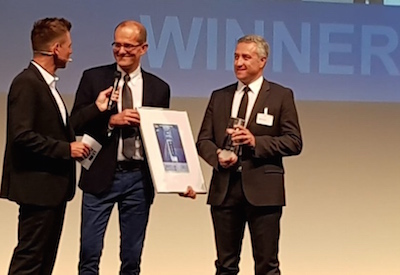ABB’s PVS-175 inverter Receives InterSolar’s Product of the Year Award

June 25, 2018
ABB’s award-winning PVS string inverter range delivers a six-in-one, high voltage solution for both large-scale commercial and industrial ground mounted and rooftop applications.
For over 10 years, the InterSolar Product of the Year award winners have reflected developments in the modern energy supply and motivated the industry to play an active part in shaping the energy future with constantly new, groundbreaking innovations. In line with market trends that are moving towards higher voltages and higher power classes/ratings, ABB’s PVS series enables installers to take advantage of greater performance efficiencies, scalability, flexibility, reduced environmental impact and improved reliability.
In 2018, the InterSolar spotlight was on solutions that exploit a product’s characteristics to achieve the best possible results. Solar module manufacturers have been able to consistently increase efficiency, with levels currently above 20%, and to extend the service life of modules to over 25 years.
In the field of inverters for large-scale plants, decentralization concepts are moving into the spotlight. As a result, new grid management functions such as the ability to perform black starts, stand-alone grid formation, and active and reactive power control as well as frequency control are improving grid integration. Digitalization is also opening up new opportunities — apps and cloud solutions are simplifying installation and assembly, smart assistance systems are taking over routine tasks, and grid structures such as wireless mesh networks are supporting system operation. And in the field of substructures, east-west systems are being constructed which are increasingly space-saving and simple to install.
Other InterSolar award finalists included:
• Ecoprogetti Srl (Italy) — the LED solar simulator Ecosun Bifacial, offering an excellent measurement accuracy (AAA), was developed to measure the I/V characteristics of the front and rear side of bifacial PV modules at the same time. Different irradiation intensities can be selected for the rear side, ensuring that the testing is flexible and realistic.
• Gujarat Borosil Ltd (India) — the new 2-millimetre-thick, fully tempered solar glass with an anti-reflection coating is a replacement for the standard 3.2 mm glass. The new glass is lighter and enables high transmission rates. The manufacturing process uses air cushion technology to prevent stripes, defective areas or discoloration and guarantees high production quality.
• Hanwha Q CELLS GmbH (Germany) — designed with round wire cell contacts and six busbars (front contacts), the half-cut cell module Q.PEAK DUO-G5 achieves a module efficiency of 19.9% with cost-effective standard p-type cells. The innovative technology Q.ANTUM DUO halves the current passing through each cell, stabilizing them and increasing their shade tolerance.
• Huawei Technologies Co., Ltd. (China) — thanks to its extremely high efficiency, the 60 kW Smart String Inverter (SUN2000-60KTL-M0) only requires passive ventilation. With features such as online monitoring of all connected strings including characteristic curve measurement, power line communications and a PID recovery mode, it has rightfully earned the product description “smart PV inverter.”
• Interfloat Corporation (Liechtenstein) — thanks to its special geometry and anti-reflective coating, the extremely low-reflection solar glass GMB DEFLECT for PV modules enables solar projects to be carried out in glare-sensitive areas such as traffic routes (rail, highways, intersections), flight paths or heavily built-up residential areas.
• Krinner Solar GmbH (Germany) — the product CAS² optimizes the highly precise manufacture of support systems for free-standing PV installations. After the CAD-based system design has been drawn up, individual and optimized plans are prepared for every PV project and the installation robots are controlled with pinpoint accuracy.
• LG Electronics Inc. (South Korea) — the LG NeON R module series features 6-inch monocrystalline high-efficiency cells, entirely rear contacted, with multi ribbon busbar technology. An extremely high module efficiency of over 21% along with a 25-year module performance warranty, high mechanical resilience, reverse current carrying capacity and impressive temperature behaviour make the series worthy of recognition.
• Lumeta Solar (USA) — the glassless module Lumeta Lynx for lightweight roofs is attached to the roof surface using a thermoplastic adhesive. Special cable ducts and junction boxes round off the concept. The use of monocrystalline PERC cells enables a module efficiency of 18.3% to be achieved.
• RenewSys India Pvt. Ltd. (India) — the new encapsulation film CONSERV E 360 Polyolefin Elastomer Encapsulant is anticipated to replace the commonly used EVA film in the production of solar modules. The material is particularly remarkable for its high insulating ability, excellent protection against potential-induced degradation (PID), improved mechanical stability and low permeability to moisture.











![Guide to the Canadian Electrical Code, Part 1[i], 26th Edition– A Road Map: Section 56](https://electricalindustry.ca/wp-content/uploads/2022/11/Guide-CE-Code-2.png)



